LAW6501: Contract Law Case Study - Offer, Acceptance, and Invitation
VerifiedAdded on 2023/06/08
|5
|1513
|411
Case Study
AI Summary
This case study examines contract law principles, specifically focusing on offer, acceptance, and invitation to treat, within the context of a dispute involving Swan Valley Pty Ltd (SVP), Best Fruit, and Lin. The analysis determines whether valid contracts were formed between SVP and Best Fruit, and SVP and Lin, based on their interactions following SVP's advertisement in the 'National Advertiser'. The solution applies relevant Australian contract law, including principles from cases like Carlill v. Carbolic Smoke Ball Co., Partridge v. Crittenden, and Hyde v. Wrench, to assess the validity of offers, acceptances, and counteroffers. The conclusion finds that no contract was established between SVP and Best Fruit due to Best Fruit's invalid acceptance of an invitation to treat. However, a valid contract was formed between SVP and Lin on February 8th, when Lin accepted SVP's counteroffer. The document includes a bibliography of legal resources used in the analysis. Desklib provides a platform to access similar solved assignments and study resources for students.
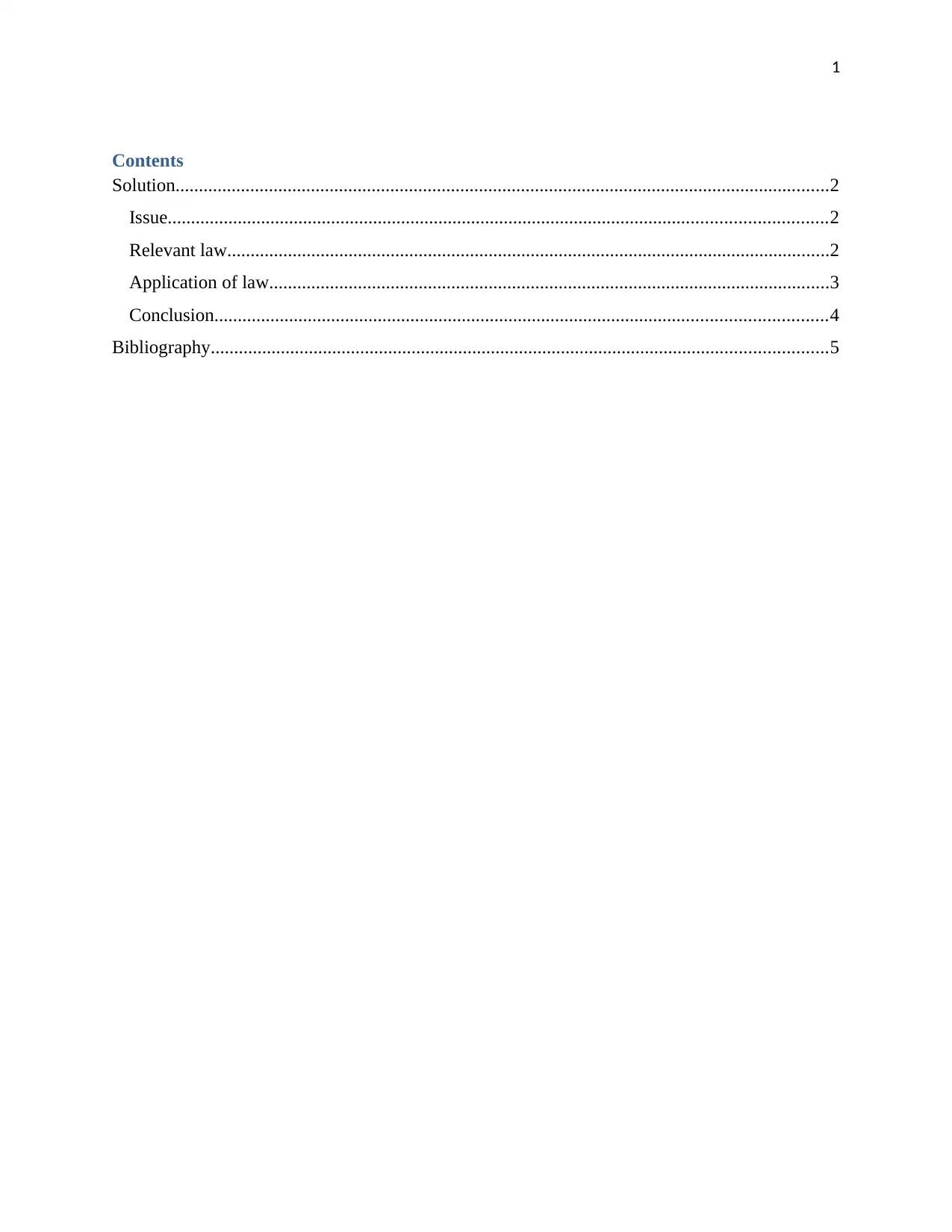
1
Contents
Solution............................................................................................................................................2
Issue.............................................................................................................................................2
Relevant law.................................................................................................................................2
Application of law........................................................................................................................3
Conclusion...................................................................................................................................4
Bibliography....................................................................................................................................5
Contents
Solution............................................................................................................................................2
Issue.............................................................................................................................................2
Relevant law.................................................................................................................................2
Application of law........................................................................................................................3
Conclusion...................................................................................................................................4
Bibliography....................................................................................................................................5
Paraphrase This Document
Need a fresh take? Get an instant paraphrase of this document with our AI Paraphraser
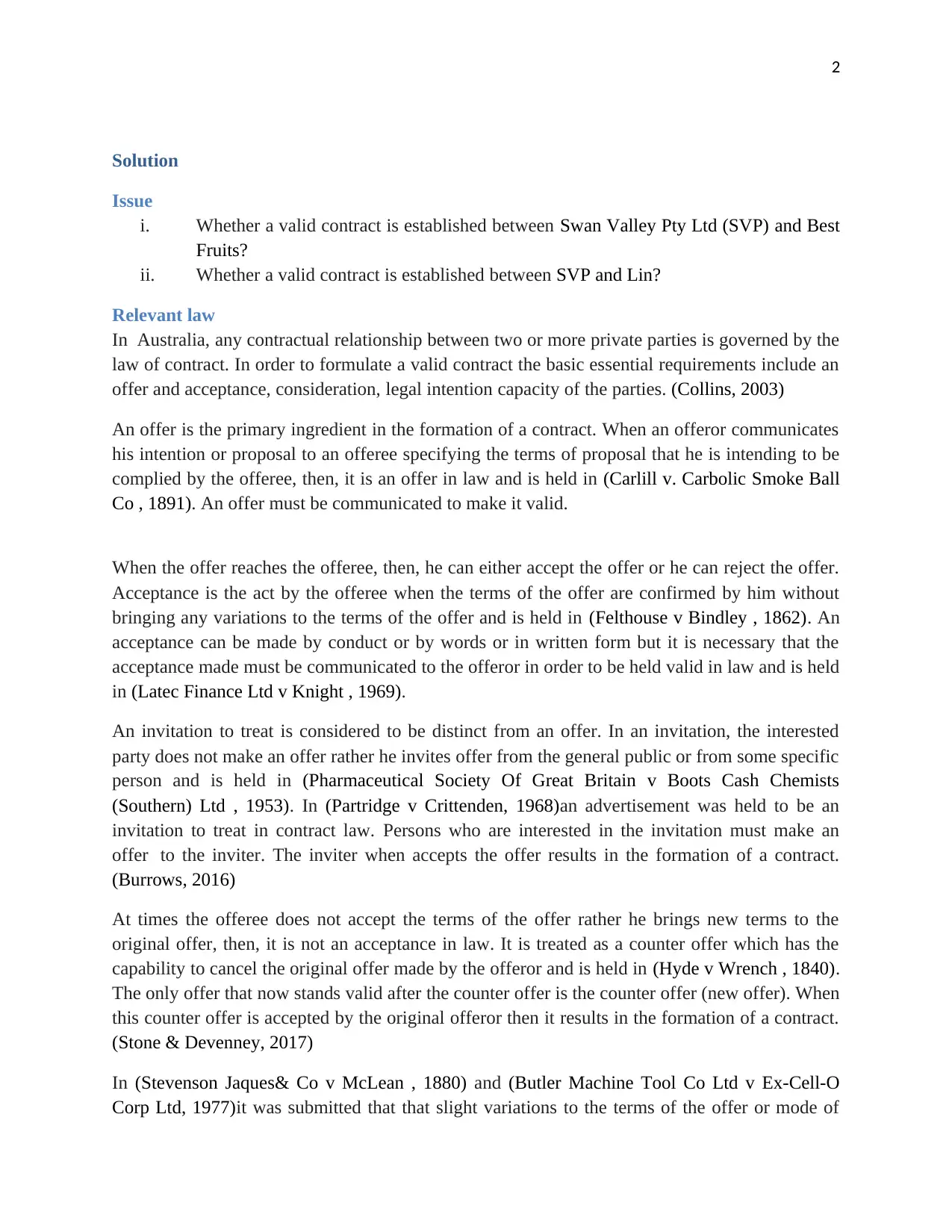
2
Solution
Issue
i. Whether a valid contract is established between Swan Valley Pty Ltd (SVP) and Best
Fruits?
ii. Whether a valid contract is established between SVP and Lin?
Relevant law
In Australia, any contractual relationship between two or more private parties is governed by the
law of contract. In order to formulate a valid contract the basic essential requirements include an
offer and acceptance, consideration, legal intention capacity of the parties. (Collins, 2003)
An offer is the primary ingredient in the formation of a contract. When an offeror communicates
his intention or proposal to an offeree specifying the terms of proposal that he is intending to be
complied by the offeree, then, it is an offer in law and is held in (Carlill v. Carbolic Smoke Ball
Co , 1891). An offer must be communicated to make it valid.
When the offer reaches the offeree, then, he can either accept the offer or he can reject the offer.
Acceptance is the act by the offeree when the terms of the offer are confirmed by him without
bringing any variations to the terms of the offer and is held in (Felthouse v Bindley , 1862). An
acceptance can be made by conduct or by words or in written form but it is necessary that the
acceptance made must be communicated to the offeror in order to be held valid in law and is held
in (Latec Finance Ltd v Knight , 1969).
An invitation to treat is considered to be distinct from an offer. In an invitation, the interested
party does not make an offer rather he invites offer from the general public or from some specific
person and is held in (Pharmaceutical Society Of Great Britain v Boots Cash Chemists
(Southern) Ltd , 1953). In (Partridge v Crittenden, 1968)an advertisement was held to be an
invitation to treat in contract law. Persons who are interested in the invitation must make an
offer to the inviter. The inviter when accepts the offer results in the formation of a contract.
(Burrows, 2016)
At times the offeree does not accept the terms of the offer rather he brings new terms to the
original offer, then, it is not an acceptance in law. It is treated as a counter offer which has the
capability to cancel the original offer made by the offeror and is held in (Hyde v Wrench , 1840).
The only offer that now stands valid after the counter offer is the counter offer (new offer). When
this counter offer is accepted by the original offeror then it results in the formation of a contract.
(Stone & Devenney, 2017)
In (Stevenson Jaques& Co v McLean , 1880) and (Butler Machine Tool Co Ltd v Ex-Cell-O
Corp Ltd, 1977)it was submitted that that slight variations to the terms of the offer or mode of
Solution
Issue
i. Whether a valid contract is established between Swan Valley Pty Ltd (SVP) and Best
Fruits?
ii. Whether a valid contract is established between SVP and Lin?
Relevant law
In Australia, any contractual relationship between two or more private parties is governed by the
law of contract. In order to formulate a valid contract the basic essential requirements include an
offer and acceptance, consideration, legal intention capacity of the parties. (Collins, 2003)
An offer is the primary ingredient in the formation of a contract. When an offeror communicates
his intention or proposal to an offeree specifying the terms of proposal that he is intending to be
complied by the offeree, then, it is an offer in law and is held in (Carlill v. Carbolic Smoke Ball
Co , 1891). An offer must be communicated to make it valid.
When the offer reaches the offeree, then, he can either accept the offer or he can reject the offer.
Acceptance is the act by the offeree when the terms of the offer are confirmed by him without
bringing any variations to the terms of the offer and is held in (Felthouse v Bindley , 1862). An
acceptance can be made by conduct or by words or in written form but it is necessary that the
acceptance made must be communicated to the offeror in order to be held valid in law and is held
in (Latec Finance Ltd v Knight , 1969).
An invitation to treat is considered to be distinct from an offer. In an invitation, the interested
party does not make an offer rather he invites offer from the general public or from some specific
person and is held in (Pharmaceutical Society Of Great Britain v Boots Cash Chemists
(Southern) Ltd , 1953). In (Partridge v Crittenden, 1968)an advertisement was held to be an
invitation to treat in contract law. Persons who are interested in the invitation must make an
offer to the inviter. The inviter when accepts the offer results in the formation of a contract.
(Burrows, 2016)
At times the offeree does not accept the terms of the offer rather he brings new terms to the
original offer, then, it is not an acceptance in law. It is treated as a counter offer which has the
capability to cancel the original offer made by the offeror and is held in (Hyde v Wrench , 1840).
The only offer that now stands valid after the counter offer is the counter offer (new offer). When
this counter offer is accepted by the original offeror then it results in the formation of a contract.
(Stone & Devenney, 2017)
In (Stevenson Jaques& Co v McLean , 1880) and (Butler Machine Tool Co Ltd v Ex-Cell-O
Corp Ltd, 1977)it was submitted that that slight variations to the terms of the offer or mode of
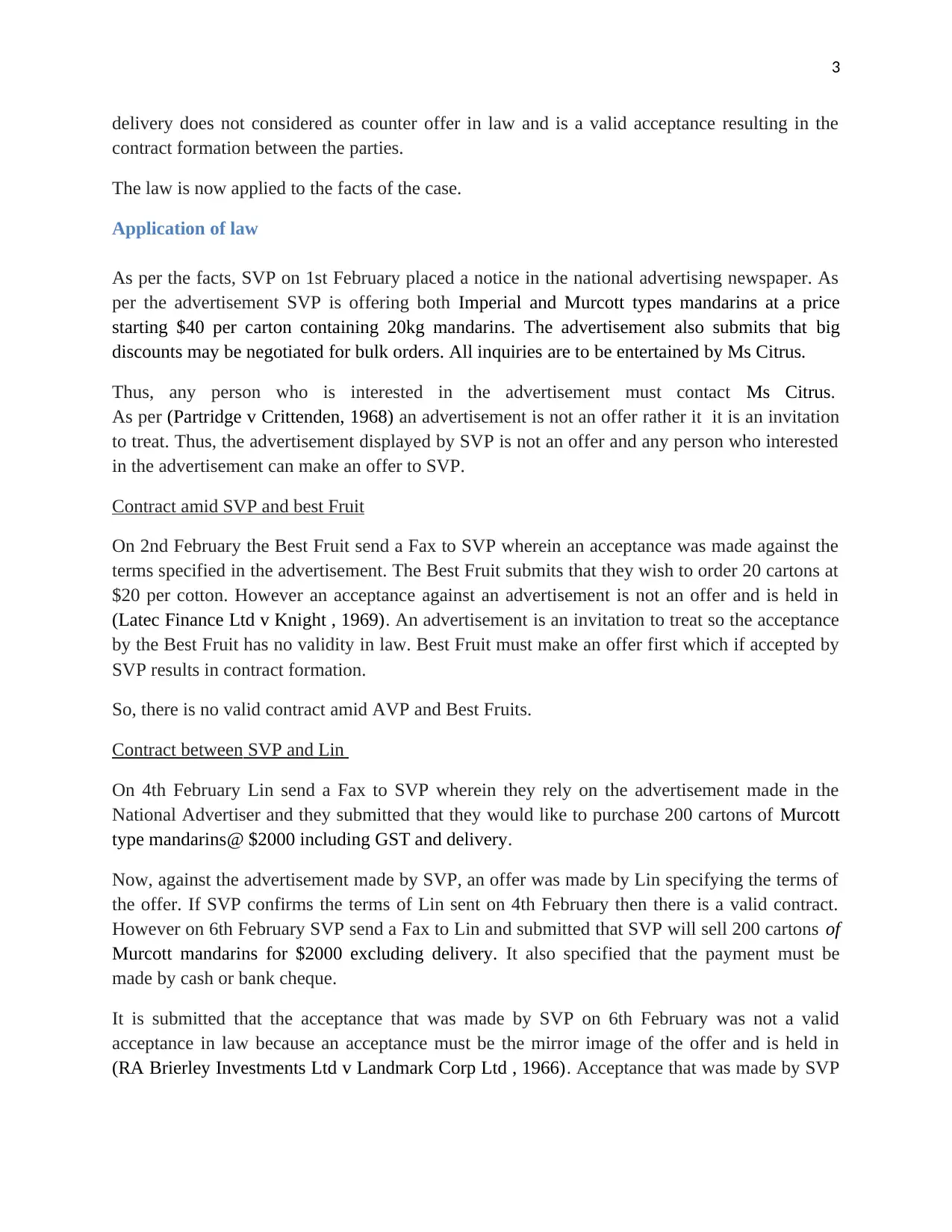
3
delivery does not considered as counter offer in law and is a valid acceptance resulting in the
contract formation between the parties.
The law is now applied to the facts of the case.
Application of law
As per the facts, SVP on 1st February placed a notice in the national advertising newspaper. As
per the advertisement SVP is offering both Imperial and Murcott types mandarins at a price
starting $40 per carton containing 20kg mandarins. The advertisement also submits that big
discounts may be negotiated for bulk orders. All inquiries are to be entertained by Ms Citrus.
Thus, any person who is interested in the advertisement must contact Ms Citrus.
As per (Partridge v Crittenden, 1968) an advertisement is not an offer rather it it is an invitation
to treat. Thus, the advertisement displayed by SVP is not an offer and any person who interested
in the advertisement can make an offer to SVP.
Contract amid SVP and best Fruit
On 2nd February the Best Fruit send a Fax to SVP wherein an acceptance was made against the
terms specified in the advertisement. The Best Fruit submits that they wish to order 20 cartons at
$20 per cotton. However an acceptance against an advertisement is not an offer and is held in
(Latec Finance Ltd v Knight , 1969). An advertisement is an invitation to treat so the acceptance
by the Best Fruit has no validity in law. Best Fruit must make an offer first which if accepted by
SVP results in contract formation.
So, there is no valid contract amid AVP and Best Fruits.
Contract between SVP and Lin
On 4th February Lin send a Fax to SVP wherein they rely on the advertisement made in the
National Advertiser and they submitted that they would like to purchase 200 cartons of Murcott
type mandarins@ $2000 including GST and delivery.
Now, against the advertisement made by SVP, an offer was made by Lin specifying the terms of
the offer. If SVP confirms the terms of Lin sent on 4th February then there is a valid contract.
However on 6th February SVP send a Fax to Lin and submitted that SVP will sell 200 cartons of
Murcott mandarins for $2000 excluding delivery. It also specified that the payment must be
made by cash or bank cheque.
It is submitted that the acceptance that was made by SVP on 6th February was not a valid
acceptance in law because an acceptance must be the mirror image of the offer and is held in
(RA Brierley Investments Ltd v Landmark Corp Ltd , 1966). Acceptance that was made by SVP
delivery does not considered as counter offer in law and is a valid acceptance resulting in the
contract formation between the parties.
The law is now applied to the facts of the case.
Application of law
As per the facts, SVP on 1st February placed a notice in the national advertising newspaper. As
per the advertisement SVP is offering both Imperial and Murcott types mandarins at a price
starting $40 per carton containing 20kg mandarins. The advertisement also submits that big
discounts may be negotiated for bulk orders. All inquiries are to be entertained by Ms Citrus.
Thus, any person who is interested in the advertisement must contact Ms Citrus.
As per (Partridge v Crittenden, 1968) an advertisement is not an offer rather it it is an invitation
to treat. Thus, the advertisement displayed by SVP is not an offer and any person who interested
in the advertisement can make an offer to SVP.
Contract amid SVP and best Fruit
On 2nd February the Best Fruit send a Fax to SVP wherein an acceptance was made against the
terms specified in the advertisement. The Best Fruit submits that they wish to order 20 cartons at
$20 per cotton. However an acceptance against an advertisement is not an offer and is held in
(Latec Finance Ltd v Knight , 1969). An advertisement is an invitation to treat so the acceptance
by the Best Fruit has no validity in law. Best Fruit must make an offer first which if accepted by
SVP results in contract formation.
So, there is no valid contract amid AVP and Best Fruits.
Contract between SVP and Lin
On 4th February Lin send a Fax to SVP wherein they rely on the advertisement made in the
National Advertiser and they submitted that they would like to purchase 200 cartons of Murcott
type mandarins@ $2000 including GST and delivery.
Now, against the advertisement made by SVP, an offer was made by Lin specifying the terms of
the offer. If SVP confirms the terms of Lin sent on 4th February then there is a valid contract.
However on 6th February SVP send a Fax to Lin and submitted that SVP will sell 200 cartons of
Murcott mandarins for $2000 excluding delivery. It also specified that the payment must be
made by cash or bank cheque.
It is submitted that the acceptance that was made by SVP on 6th February was not a valid
acceptance in law because an acceptance must be the mirror image of the offer and is held in
(RA Brierley Investments Ltd v Landmark Corp Ltd , 1966). Acceptance that was made by SVP
⊘ This is a preview!⊘
Do you want full access?
Subscribe today to unlock all pages.

Trusted by 1+ million students worldwide
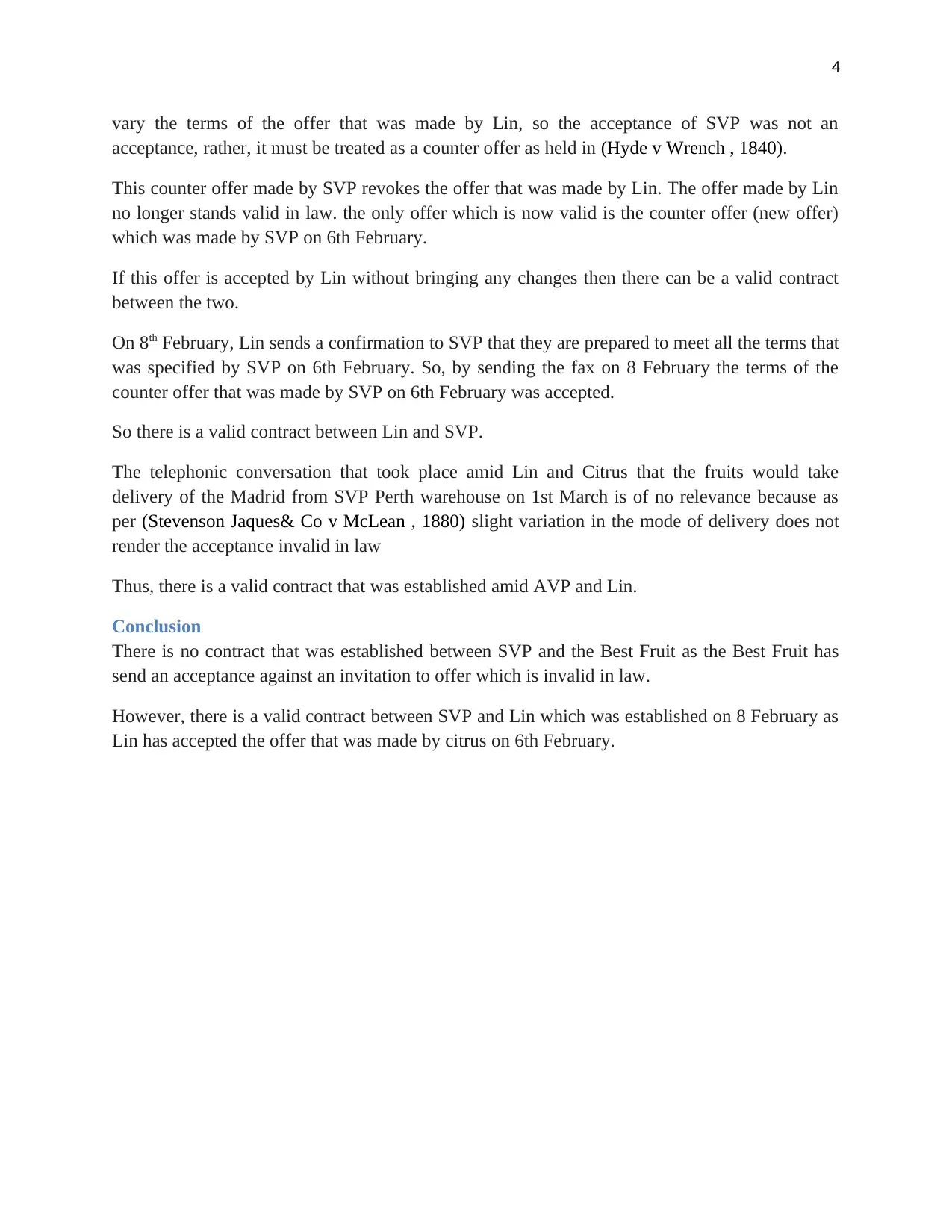
4
vary the terms of the offer that was made by Lin, so the acceptance of SVP was not an
acceptance, rather, it must be treated as a counter offer as held in (Hyde v Wrench , 1840).
This counter offer made by SVP revokes the offer that was made by Lin. The offer made by Lin
no longer stands valid in law. the only offer which is now valid is the counter offer (new offer)
which was made by SVP on 6th February.
If this offer is accepted by Lin without bringing any changes then there can be a valid contract
between the two.
On 8th February, Lin sends a confirmation to SVP that they are prepared to meet all the terms that
was specified by SVP on 6th February. So, by sending the fax on 8 February the terms of the
counter offer that was made by SVP on 6th February was accepted.
So there is a valid contract between Lin and SVP.
The telephonic conversation that took place amid Lin and Citrus that the fruits would take
delivery of the Madrid from SVP Perth warehouse on 1st March is of no relevance because as
per (Stevenson Jaques& Co v McLean , 1880) slight variation in the mode of delivery does not
render the acceptance invalid in law
Thus, there is a valid contract that was established amid AVP and Lin.
Conclusion
There is no contract that was established between SVP and the Best Fruit as the Best Fruit has
send an acceptance against an invitation to offer which is invalid in law.
However, there is a valid contract between SVP and Lin which was established on 8 February as
Lin has accepted the offer that was made by citrus on 6th February.
vary the terms of the offer that was made by Lin, so the acceptance of SVP was not an
acceptance, rather, it must be treated as a counter offer as held in (Hyde v Wrench , 1840).
This counter offer made by SVP revokes the offer that was made by Lin. The offer made by Lin
no longer stands valid in law. the only offer which is now valid is the counter offer (new offer)
which was made by SVP on 6th February.
If this offer is accepted by Lin without bringing any changes then there can be a valid contract
between the two.
On 8th February, Lin sends a confirmation to SVP that they are prepared to meet all the terms that
was specified by SVP on 6th February. So, by sending the fax on 8 February the terms of the
counter offer that was made by SVP on 6th February was accepted.
So there is a valid contract between Lin and SVP.
The telephonic conversation that took place amid Lin and Citrus that the fruits would take
delivery of the Madrid from SVP Perth warehouse on 1st March is of no relevance because as
per (Stevenson Jaques& Co v McLean , 1880) slight variation in the mode of delivery does not
render the acceptance invalid in law
Thus, there is a valid contract that was established amid AVP and Lin.
Conclusion
There is no contract that was established between SVP and the Best Fruit as the Best Fruit has
send an acceptance against an invitation to offer which is invalid in law.
However, there is a valid contract between SVP and Lin which was established on 8 February as
Lin has accepted the offer that was made by citrus on 6th February.
Paraphrase This Document
Need a fresh take? Get an instant paraphrase of this document with our AI Paraphraser
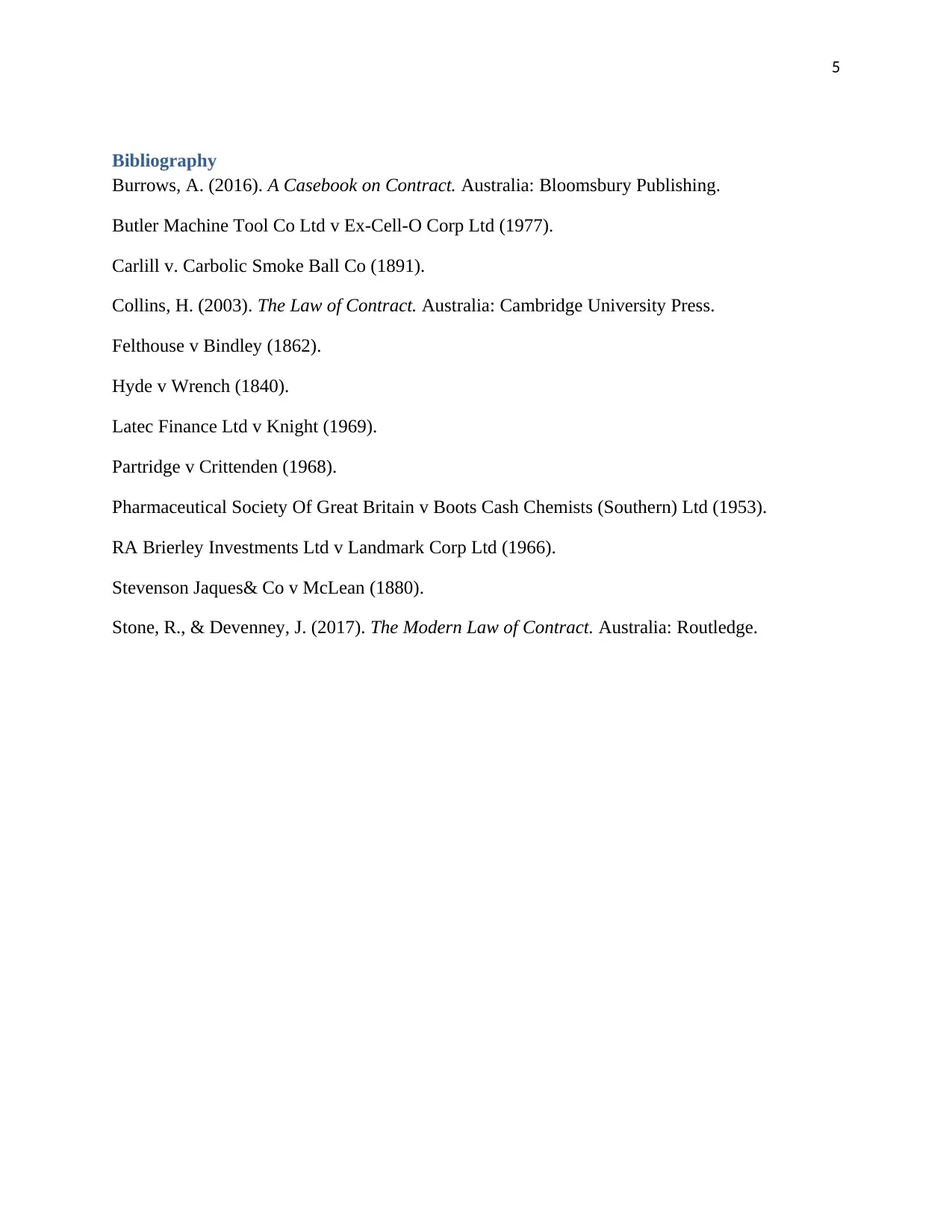
5
Bibliography
Burrows, A. (2016). A Casebook on Contract. Australia: Bloomsbury Publishing.
Butler Machine Tool Co Ltd v Ex-Cell-O Corp Ltd (1977).
Carlill v. Carbolic Smoke Ball Co (1891).
Collins, H. (2003). The Law of Contract. Australia: Cambridge University Press.
Felthouse v Bindley (1862).
Hyde v Wrench (1840).
Latec Finance Ltd v Knight (1969).
Partridge v Crittenden (1968).
Pharmaceutical Society Of Great Britain v Boots Cash Chemists (Southern) Ltd (1953).
RA Brierley Investments Ltd v Landmark Corp Ltd (1966).
Stevenson Jaques& Co v McLean (1880).
Stone, R., & Devenney, J. (2017). The Modern Law of Contract. Australia: Routledge.
Bibliography
Burrows, A. (2016). A Casebook on Contract. Australia: Bloomsbury Publishing.
Butler Machine Tool Co Ltd v Ex-Cell-O Corp Ltd (1977).
Carlill v. Carbolic Smoke Ball Co (1891).
Collins, H. (2003). The Law of Contract. Australia: Cambridge University Press.
Felthouse v Bindley (1862).
Hyde v Wrench (1840).
Latec Finance Ltd v Knight (1969).
Partridge v Crittenden (1968).
Pharmaceutical Society Of Great Britain v Boots Cash Chemists (Southern) Ltd (1953).
RA Brierley Investments Ltd v Landmark Corp Ltd (1966).
Stevenson Jaques& Co v McLean (1880).
Stone, R., & Devenney, J. (2017). The Modern Law of Contract. Australia: Routledge.
1 out of 5
Related Documents
Your All-in-One AI-Powered Toolkit for Academic Success.
+13062052269
info@desklib.com
Available 24*7 on WhatsApp / Email
![[object Object]](/_next/static/media/star-bottom.7253800d.svg)
Unlock your academic potential
Copyright © 2020–2026 A2Z Services. All Rights Reserved. Developed and managed by ZUCOL.




